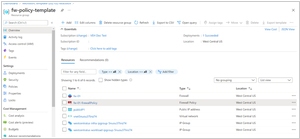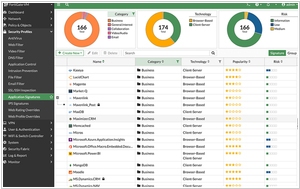Azure Firewall vs FortiGate
August 05, 2023 | Author: Michael Stromann
See also:
Top 10 Firewall software
Top 10 Firewall software
Azure Firewall and FortiGate are two popular network security solutions, but they have distinct differences in terms of deployment, features, and target markets. Firstly, Azure Firewall is a cloud-native firewall service provided by Microsoft specifically designed for securing resources and applications hosted on the Azure cloud platform. It offers centralized management, high availability, and scalability, making it an ideal choice for organizations heavily invested in the Azure ecosystem. Azure Firewall primarily focuses on basic firewall functionalities such as packet filtering, network address translation (NAT), and application rule controls. While it integrates well with other Azure services, it may lack some of the advanced security features found in on-premises firewalls.
FortiGate, on the other hand, is a family of next-generation firewalls manufactured by Fortinet. FortiGate firewalls are available in various models, including physical and virtual appliances, catering to a wide range of deployment scenarios. They are known for their comprehensive security features, including intrusion prevention, application control, SSL inspection, threat intelligence integration, and advanced analytics. FortiGate is suitable for both on-premises and cloud environments, providing organizations with the flexibility to secure their networks across different infrastructures. Fortinet's focus on security efficacy and a wide array of features makes FortiGate a popular choice for enterprises with diverse security requirements.
Another key difference between Azure Firewall and FortiGate lies in their management and control. Azure Firewall is a fully managed service, meaning Microsoft takes care of updates, patches, and configuration changes. This streamlines the management process for organizations operating solely within the Azure environment. In contrast, FortiGate firewalls provide more granular control and flexibility, allowing security teams to tailor configurations according to their specific needs. While this gives FortiGate users greater control, it also means they bear the responsibility of managing updates and maintenance tasks.
See also: Top 10 Firewall software
FortiGate, on the other hand, is a family of next-generation firewalls manufactured by Fortinet. FortiGate firewalls are available in various models, including physical and virtual appliances, catering to a wide range of deployment scenarios. They are known for their comprehensive security features, including intrusion prevention, application control, SSL inspection, threat intelligence integration, and advanced analytics. FortiGate is suitable for both on-premises and cloud environments, providing organizations with the flexibility to secure their networks across different infrastructures. Fortinet's focus on security efficacy and a wide array of features makes FortiGate a popular choice for enterprises with diverse security requirements.
Another key difference between Azure Firewall and FortiGate lies in their management and control. Azure Firewall is a fully managed service, meaning Microsoft takes care of updates, patches, and configuration changes. This streamlines the management process for organizations operating solely within the Azure environment. In contrast, FortiGate firewalls provide more granular control and flexibility, allowing security teams to tailor configurations according to their specific needs. While this gives FortiGate users greater control, it also means they bear the responsibility of managing updates and maintenance tasks.
See also: Top 10 Firewall software





